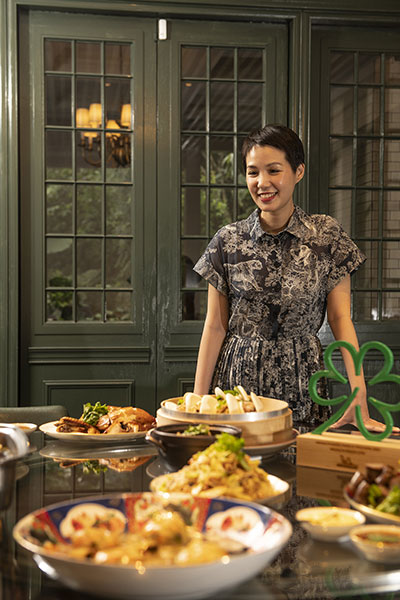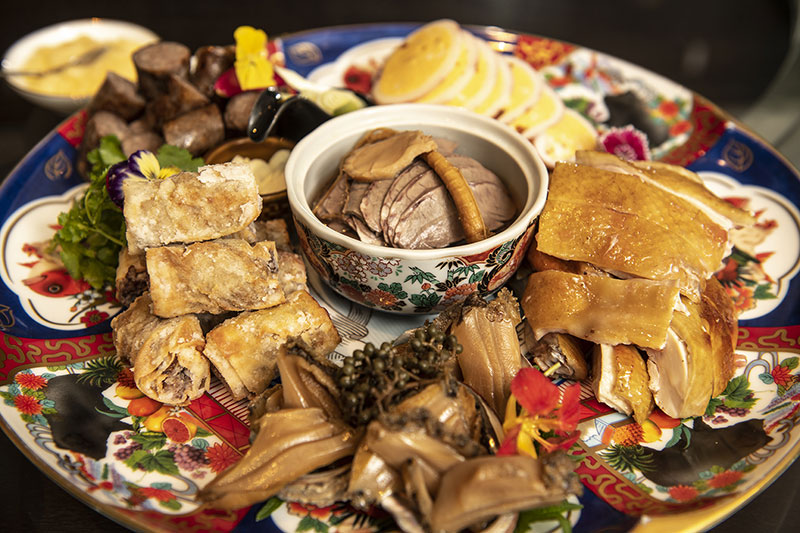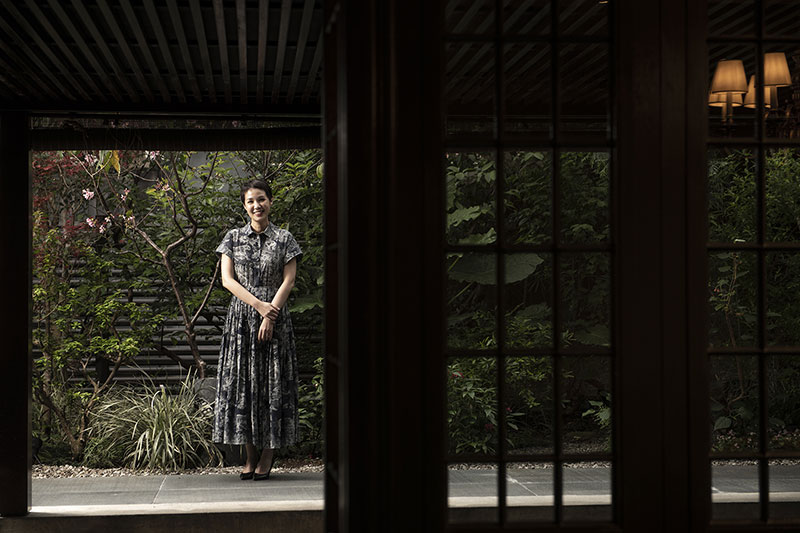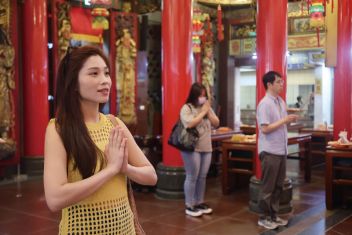
It’s not too far-fetched to say that Stephanie Ho, founder of Green & Safe and CEO of Yuen Foong Yu Biotech, would “keep her own cow to be sure of drinking good milk.” An old Chinese adage tells us that nouveau-riche families do not acquire good taste until the third generation. As a granddaughter of one of the founders of the Yuen Foong Yu Group, Ho is very particular about taste: not just aesthetic, but culinary as well.
Stephanie Ho’s decision to go into biotechnology had to do with her family’s business. The Yuen Foong Yu Group’s main activity is papermaking, an industry related to forestry and microbiology. Accordingly, as early as 1998, Yuen Foong Yu Biotech was founded to promote organic farming. At 25, having just graduated from Brown University, and with a bright future ahead of her, Ho rejected both papermaking and a lucrative career in finance. Instead, she chose agriculture, a field unfamiliar to her at that time.
Yuen Foong Yu Biotech currently manages a brand of organic products called Green & Safe, as well as three restaurants with very different styles and customer bases: Qimin Market, Mountain and Sea House, and Farm Table. It is one of the few companies in the organic sector that are able to cover both upstream and downstream supply chains, both online and offline services, and both food service and retail.

Wherever possible, Mountain and Sea House uses local meat and vegetables with low food miles. It is also committed to promoting native produce through traditional Taiwanese cooking methods, bringing classic local flavors to the wider world.
A green gatekeeper
In order to reduce social contact during the pandemic, even those who are used to dining out have begun to spend more time in their own kitchens. Fruit and veg parcels and ready-made meals have suddenly become all the rage. Green & Safe, which has attracted much public attention, has been playing a leading role.
While health food stores are not rare in our cities, Green & Safe offers something slightly different. In its brightly lit shops, we don’t come across a lot of health supplements or imported produce, but rather seasonal fruit and vegetables that come straight from its partner farms, domestically sourced meat and fish, and processed foods and ready-made meals that are especial favorites with dual-career families and single people. Insisting on traceability in supply chains and opting for simple ingredients, Green & Safe enables its customers to feel the vitality of food.
Stephanie Ho believes that “real food” and “no additives” should be more than mere slogans. In addition to internal quality control processes, she sends her products to a third party, the Anti-Additive Clean Label Organization. So far, 311 of Green & Safe’s products have received A.A. Clean Label certification—more than any other company in Asia.
Both organic and delicious
Although Ho denies being an epicure, her work has always been inseparable from food culture. A seasoned diner-out, she has even served on the judging panel for the 500 Dishes Award, an event that celebrates Taiwan’s gastronomical delights. Ho’s opinions on food are buttressed by her close observations of culinary fashions and market trends.
“We’re one of the few brands in the organic sector that set great store by good flavors,” Ho says. Her ready-made meals, which have been selling like hot cakes during the pandemic, were already available in 2015. Be it snacks, congees, sauces, braised foods, meatballs, or dumplings, Green & Safe’s range of products encompasses everything. The company has even launched a series of pioneering projects, collaborating with Bo.lan (a Bangkok-based restaurant selected as one of Asia’s 50 Best Restaurants), food writer Tzu-i Chuang Mullinax, and, more recently, several of Taiwan’s Michelin-starred chefs. Ever sensitive to market trends, Green & Safe appeals to many epicures who are not usually sticklers for organic products.
Distinctly female points of view have also come into play. “Even now, it’s usually women who do the grocery shopping for their families.” A professional woman herself, Ho feels for those women who buy healthy vegetable parcels for their families, but find it impossible to cook everything because they have to work. As Ho tells us, one of the reasons why Green & Safe became the first company to start promoting ready-made meals was this feeling of empathy with its customers.
The majority of its employees being women, the company emanates a female sensibility. Endeavoring not to waste any food, and paying attention to both nutrition and taste, it adopts a thoughtful, meticulous approach that has its origin in the culinary practice of traditional housewives. This approach continues to resonate with younger family cooks today, male and female alike.

Stephanie Ho uses her feminine sensitivity and caring nature in managing her brand, showing us that women today can continue to be nutritional gatekeepers despite their changing roles.
Organic restaurants
In the past, most people didn’t think of organic foods as particularly appetizing, and there was a perception that only the ill or the elderly would be interested in going organic for the good of their health. In order to break this stereotype, Yuen Foong Yu Biotech established its first restaurant—Qimin Market—in 2013. “The major function of our restaurants is to demonstrate how we work with food, so that customers can get to know us, as well as our products,” Ho says.
Qimin Market derives its name from Qimin Yaoshu (“Essential Skills for the Common People”), a sixth-century Chinese text on farming and domestic economy. As a shabu-shabu hotpot restaurant, Qimin Market seeks to highlight the authentic flavors of food, and is particularly popular among older people. On the other hand, Yuen Foong Yu Biotech’s latest venture, Farm Table, is targeted at young families. As for Mountain and Sea House, this is a masterpiece devoted both to the rediscovery of old Taiwanese dishes and to culinary innovation, emphasizing top quality in its ingredients, culinary skills, furnishings, and service.
International renown
Ho spent much time abroad when she was young and has made quite a few visits to classy restaurants. A gentle soul by nature, she nevertheless shows great ambition when it comes to Taiwanese food. “Speaking of fine dining, French cuisine is the fountainhead, and Japan has kaiseki [traditional multi-course haute cuisine]. Taiwan has its renowned street foods, but we also hope to have Taiwanese fine dining. In addition to exhibiting our cultural characteristics, we want beauty and texture.”
Ho has achieved that. For three years running, Mountain and Sea House has been awarded a Michelin star. Before the advent of Covid, 30–40% of its customers were international visitors. They all came to savor deluxe, masterfully crafted Taiwanese dishes.
However, the exquisitely tasty food may easily lead one to overlook how much effort Mountain and Sea House puts into practicing environmental sustainability. Adopting the island’s own produce, it uses native pork, beef, and chicken, which are reminiscent of old Taiwanese cuisine. Its fish are freshly caught by sustainable methods, such as pole-and-line and longline fishing. It also embraces local seasonal vegetables, offering charcoal-grilled wild mushrooms and ailanthus prickly ash, which is often used by indigenous cooks. Despite having to go through complex and time-consuming procedures, Mountain and Sea House refuses to compromise its high standards.
In 2021 Mountain and Sea House not only kept its Michelin star, but was awarded a Michelin green star as well. Only one other restaurant in Taiwan has received the latter honor. Evidently the staff take more pride in this than in getting the usual Michelin star. Ho explains that the green star represents the head chef’s hard work in designing the menus, the chefs’ skills, and the dedication of the procurement and production management departments. “The pressure is not just on the head chef. The abilities of the entire team are also being tested.”
In the past, when the island was still predominantly agricultural, men would go out to work, and women would remain at home to perform their household duties. Responsible for cooking, housewives played a crucial role in ensuring their families’ physical wellbeing. In modern Taiwan, women also go out to work, but, being caring and attentive to details, many of them continue to serve as nutritional gatekeepers. Stephanie Ho, who has been working in the food and agriculture industry for more than 20 years, represents a role model.
For more pictures, please click《Standing Up for Real Food: Yuen Foong Yu Biotech CEO Stephanie Ho》











